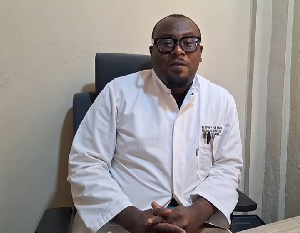- Home - News
- Elections 2024
- News Archive
- Crime & Punishment
- Politics
- Regional
- Editorial
- Health
- Ghanaians Abroad
- Tabloid
- Africa
- Religion
- Photo Archives
- Press Release
General News of Tuesday, 29 April 2025
Source: www.ghanawebbers.com
Drug resistance to malaria: Physician Specialist urges compliance with drug dosage and time of administration
Dr. Jeffery Fui Kudiabor is a Physician Specialist and Medical Superintendent at Banhart Hospital in Kenyasi, Ahafo region. He urges people diagnosed with malaria to follow their medication strictly. This includes adhering to the prescribed dosage, timing, and specific brands. Doing so helps prevent the malaria parasite from developing resistance.
In an interview with JoyNews for World Malaria Day, he emphasized completing the full course of medication. He also recommended laboratory tests to ensure the parasite is fully eradicated.
World Malaria Day is observed on April 25 each year. It recognizes global efforts to combat malaria by all member states of the World Health Organization (WHO). The theme for 2025 is "Malaria Ends With Us: Reinvest, Reimagine, Reignite." This theme encourages renewed commitment at all levels, focusing on investment and collaboration.
Globally, 3.3 billion people in 106 countries are at risk of malaria. In 2012, there were about 627,000 deaths from malaria, mostly among African children. Asia and Latin America are also affected, along with parts of Europe and the Middle East.
According to the latest World Malaria Report, malaria caused 429,000 deaths globally in 2015. That year saw 212 million new cases reported. Between 2010 and 2015, new malaria cases fell by 21% worldwide. Death rates decreased by 29% during that same period.
Dr. Kudiabor explained that incomplete courses of medication contribute to drug resistance in malaria treatment. He highlighted that female Anopheles mosquitoes are key causes of this disease. He urged residents to maintain cleanliness and sleep under treated mosquito nets.
He strongly refuted the myth that sun exposure can cause malaria fever. Tackling this disease requires collective effort from everyone involved. Dr. Kudiabor reiterated that preventive measures are crucial for eradicating malaria.
He called for changes in habits among residents and sound policies from governments. Adequate funding from local and international donors is also necessary to eliminate malaria completely.











